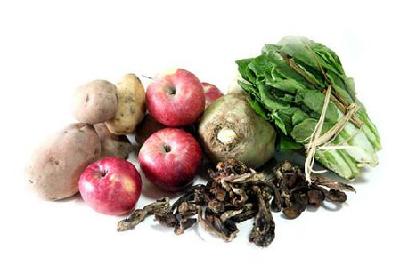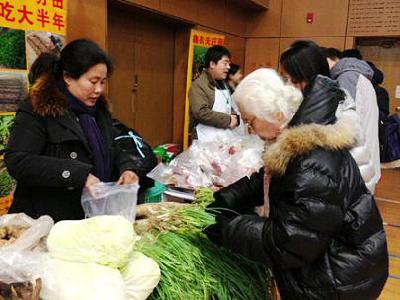 Beijing Country Fair, started in 2010 as an art project, has evolved to become a well-supported weekly market for CSA produce.
Beijing Country Fair, started in 2010 as an art project, has evolved to become a well-supported weekly market for CSA produce.
Organic, healthy and sustainable are the new keywords for a breed of socially conscious consumers and producers in the major cities of China. Han Bingbin reports on back-to-basics food networks.
China is getting richer, but with the wealth comes the accompanying problems of urbanization.
To many, it means grappling with pollution from too many cars and industrial emissions, the loss of agricultural land to city building and an increasing concern about the food they eat.
There is also a nostalgic appetite for the natural flavors from a more simple life in the past.
This nostalgia has fueled a demand for healthier organic food in China, and in the major cities like Beijing, Shanghai and Nanjing, alternative food networks and production chains have emerged in the form of farmland rental, farmers' markets and organic restaurants.
In the capital, one of the most influential networks to have emerged is the Beijing Country Fair, an organic farmers' market that is rapidly gaining recognition among the city's widening strata of middle classes, who are willing to pay more for safer, natural foods without chemical pesticides and additives.
 Beijing Country Fair, started in 2010 as an art project, has evolved to become a well-supported weekly market for CSA produce.
Beijing Country Fair, started in 2010 as an art project, has evolved to become a well-supported weekly market for CSA produce.
Each week, the market gathers around 20 small- and medium-sized local family farms that sell homegrown produce ranging from rice, vegetables, chicken, eggs and meat. There are also a couple of families who make traditional, old-time snacks such as vegetarian buns and candied hawthorn strips.
First mooted by two foreign artists in 2010 as an art project observing the relationship between food and society, the market attracted mainly foreign expatriates in the beginning. Things started changing after the organizers opened an account on Sina Weibo, China's biggest micro-blogging site.
This became an information platform through which the organizers broadcast both the market venues and the produce available that particular week, but it also started to build an active online community that eagerly shares news and knowledge. At the moment, it has about 63,000 who are linked to its blog daily.
